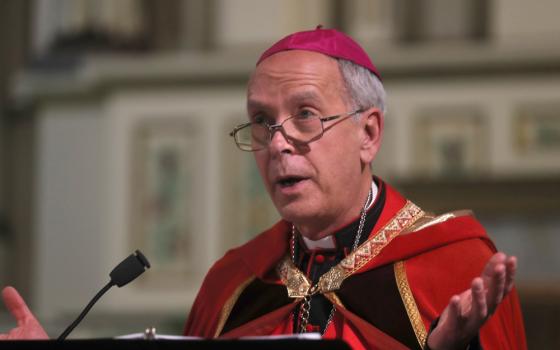Last week, between the two poles of my swinging pendulum from desert life to hectic travel, I spent a few days alone hiking the lush Redwood National Forest in northern California. I went with a purpose in mind -- to prepare my mind for trial. It was looming and bearing down. I faced the possibility of six months for my protest on Holy Thursday at Creech Air Force Base in Nevada, home to our unmanned drones. But just before I left, word came down. The prosecutor had dropped all charges. I headed for the stately forest just the same.
Little on the planet prepares you for such a sight. The coastal redwoods are the largest trees on the globe. Some reach 35 stories tall, some are 1,500 years old. I ambled into vast groves of them, my neck craning upward, the sky nearly hidden. Seldom does a sunbeam find its way to the ground.
I had entered upon a sacred world, like a cathedral or a monastery. The mountain air refreshed my senses; the stunning silence and ancient giants put my short life in perspective. Here in the wooded cathedral I found mindfulness-made-easy. Here was Living Peace 101, the Spiritual Life for Dummies. All one has to do is look and breathe. God does the rest.
There the fragrance of God lingers on the air. Said one smitten park ranger: “These groves are God’s fingerprints.” They seemed to be stretching upward to touch God’s face. And it’s why several early environmentalists, around the time of the First World War, campaigned to protect this land. If people came here, they rightly figured, folks would find God, and the things that make for war would vanish. The redwoods would teach them peace. That was their hope.
And so I trod gently and opened my senses. And soon tears began -- tears of grief for the suffering world, for the destruction of the earth; tears of joy from this immersion in God’s grandeur, the sheer height and length and breadth, the wonder of it all. It was as if I had joined a Communion line, a sacred moment in store at the end of the aisle. Except here, time and space evaporate. Everywhere I turned, I found the Creator.
I drove for miles through the redwood groves right along the northern California coast; sat at the edge of cliffs overlooking the Pacific; walked rocky beaches; and came upon several herds of elk. In one field, the elk were sitting down resting in the tall grass. All you could see were mammoth antlers sticking out above the grass. I breathed deep and for a time shed the memory of the travails of the world.
I took the roundabout route because I had a particular destination in mind. It was the Monastery of the Redwoods, a community of Cistercian nuns founded in the early 1960s. From Garberville, you drive toward the coast along serpentine roads and enter redwood forests close to the cliffs of Shelter Cove.
Near Whitehorn, you head down another country lane until you see a sign. Soon you’ll find yourself in an open field bounded by ancient Redwoods on primeval hills. The monastery is in the field. A few modest buildings surround the concrete block chapel, which features a massive wooden altar and a large picture window opening onto a particularly large redwood.
Here Thomas Merton came in May 1968 to offer a workshop on prayer. The place, the women, the solitude, captured his heart. And he got plans underway to move there permanently, to find a hermitage on a nearby cliff. A beautiful dream and an ideal setting. Some months later he visited again on his way to Asia. He hoped to return for Lent the following year, but he died in Bangkok.
The monastery was founded by Mother Myriam Dardenne, a Belgian nun -- a legendary woman of wisdom and spirit and charisma. Myriam first met Merton in 1961, when she stopped at the Abbey of Gethsemani on her way to California. Merton recognized right away that she was a visionary, a true leader in the church, and they became friends.
I met Myriam 10 years ago. She and I made a weeklong retreat together at Gethsemani. I liked her immensely, and we became friends. Here was a lively, charismatic, creative woman full of life and tall tales.
Some were about Merton. During his trip to Asia, she said, he sent her a postcard from Calcutta, saying he had bought an original painting of Jesus from a Calcutta shop and would be sending it to her. Of course, as a cloistered, destitute Cistercian, he never bought anything for anybody, so here was the rarest of occasions. Some weeks passed when news came to her that Merton had died. And grief descended on the small community. A year and a half later, a truck rumbled onto monastery grounds. And out stepped the driver with a bundle in his hands. Merton’s gift had finally arrived.
Her tales drew me in, and I made a mental note: I must visit her at her monastery someday. But the chance never arose. In 2002, while caring for her ill sister in her home town in Belgium, Myriam herself took ill and died.
At last, just this past week, I managed to visit. A nun ushered me across the field to a cross at the foot of a redwood. Here was a stone marker and Myriam’s ashes. I stood awhile and pondered the deep contradiction: how could a person so intensely alive and full of spirit be gone? Indeed, Myriam makes it easy for me to believe in the resurrection.
Then I got to meet Veronique, the sister who came from Belgium with Myriam nearly 50 years ago. As a young woman, Veronique left her Belgium home and walked an hour to a Cistercian monastery. When she saw the steeple in the distance, she said to herself: “Ah! My home for the rest of my life!” Little did she think she would spend most of her life in a far-off land called California -- nestled among magnificent redwoods.
The first winter, she said, took a toll. The sisters shivered nights in an abandoned shack in the field. One night the roof caught fire, their only heat that winter, and they scrambled to put it out. Some 50 years later, their amenities are still rough and simple, she says. There are a dozen sisters now, and they support themselves by selling honey and offering hospitality. But of course, living simply as they do, they still barely make ends meet.
Finally, she took me to see the gift from Merton to Myriam, the painting of Jesus now hanging in the corner of the chapel. I was touched by it. It is plain and simple, the outline of Jesus holding a large cross. The paint is marred by horizontal cracks from the canvass being rolled up for so long. Its simplicity invites compassion and peace.
My visit ended too soon, but how grateful I am for those days. The redwoods, tall and ancient, make a mockery of our sense of time. Their grandeur shrinks our self-importance. And by their ponderous silence, they refresh and renew and show us what peace looks and feels like. And the sisters maintain a living prayer, and model the Christian life of peace. I know I will return.
I find it essential to retreat periodically to monasteries and such parks. For me, there is no other way to stay involved in the long haul for justice and peace. The glories of nature restore my soul, ease my breathing, sturdy me for the road ahead. It is pristine, undisturbed nature -- and the peaceful community of prayer -- that reminds us that our life journeys are intended for peace, that the road ahead is marked by peace, that every day can be an opportunity to live and breath and welcome Christ’s peace.
May we all find such holy places to help us on our spiritual journeys, that all our days might more and more be filled with peace.
(Learn more about the Monastery of the Redwoods)
* * * * *
Next week, John Dear will speak at Stella Maris Retreat Center in New Jersey (www.stellamarisretreatcenter.com) and the Pax Christi National Assembly in Chicago (www.paxchristiusa.org). St. Anthony Messenger’s Press recently published John Dear On Peace, by Patricia Normile. John’s two new books are A Persistent Peace (Loyola Press) and Put Down Your Sword, (Eerdmans). For information on his books or to invite him to speak at your church or school, see: www.johndear.org.
* * * * * *
A Message from John Dear about his NCR Columns
Dear Friends,
Thank you very much for reading and supporting my weekly column. I’ve been writing these reflections every week for three years now, and am blessed to share my reflections, journeys, concerns and hopes.
I write now to ask your help with these writing projects. Each week about 2,500 people read these columns. NCR and I would like to reach a regular audience of 5,000 people by the end of the year. Would you please send an email to ten friends and ask them to sign up and receive my weekly column for free when it is published every Tuesday morning at NCRonline.org. Any other outreach you can give to promote this column would be greatly appreciated. Here's a page direct link to the e-mail sign up.
Thanks, too, for sharing your responses to my reflections. And thank you for all you do for justice, disarmament and peace, for teaching and practicing Gospel nonviolence.
God bless you,
Fr. John Dear, S.J.


